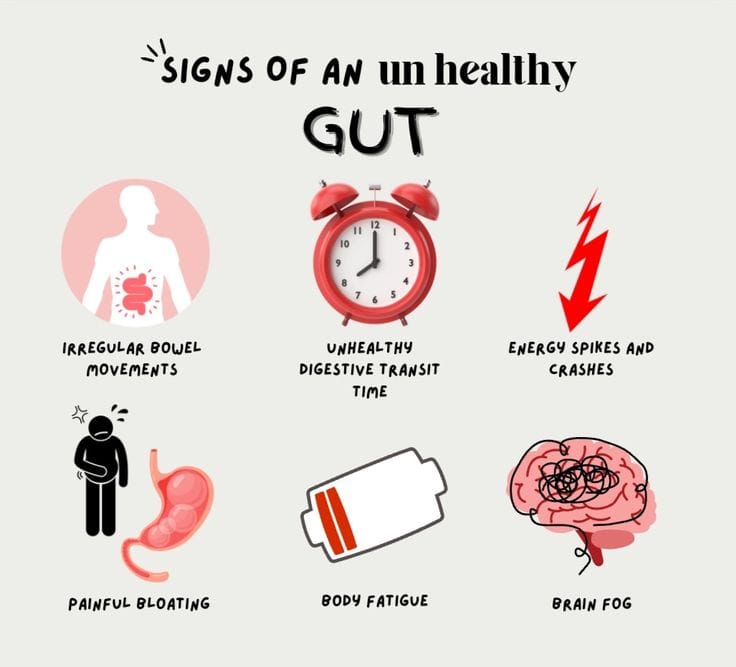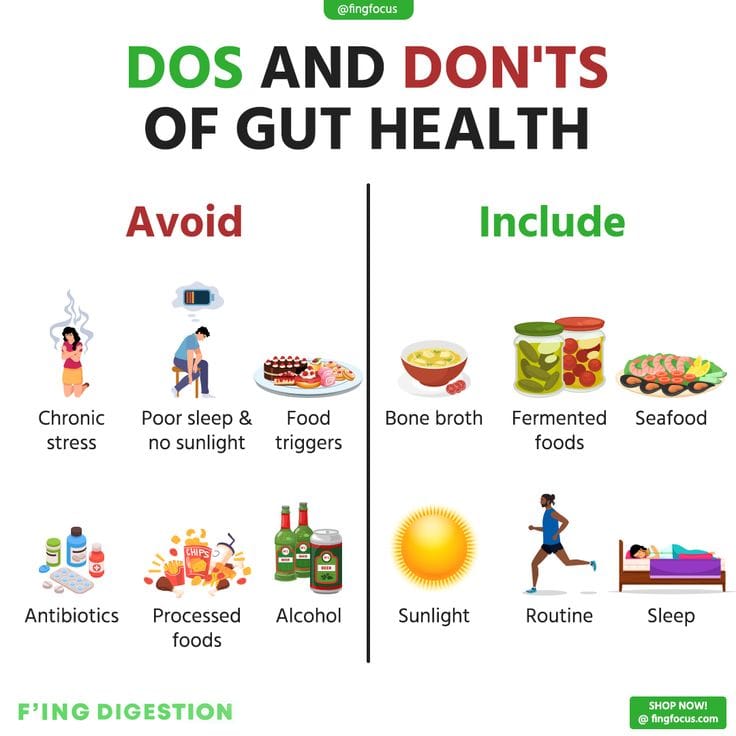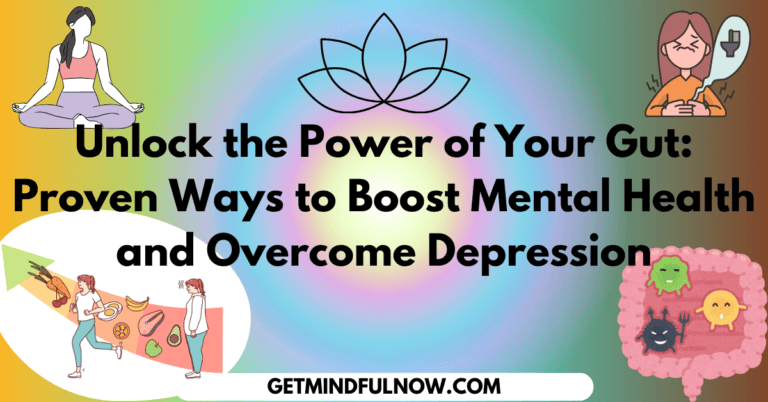Have you ever felt like your mind is clouded—like you’re trapped in a fog you can’t shake, no matter what you do? Maybe you’ve tried everything from therapy to medication, but nothing seems to work. What if I told you that the answer to clearing that mental fog could be sitting right in your gut?
It might sound strange, but recent research shows that the health of your gut can play a huge role in your mental wellbeing. In fact, conditions like anxiety, depression, and brain fog might not just be rooted in your mind—they could be linked to an imbalance in the bacteria living in your digestive system.
In this blog, we’ll explore the fascinating connection between gut health and mental health, dive into some groundbreaking research, and share actionable steps you can take to start healing from the inside out. Whether you’re struggling with mood swings or just want to improve your overall mental clarity, this could be the game-changer you’ve been looking for. Let’s dive in!
The Gut-Brain Axis: The Core Connection
The gut and brain communicate through the gut-brain axis, a complex system involving neural, hormonal, and immune pathways. The gut, often referred to as the “second brain,” houses 100 million neurons and is responsible for producing 75% of the body’s neurotransmitters, including serotonin and dopamine—key chemicals regulating mood and cognition.
Dr. Amen emphasizes that issues like anxiety and depression are often deeply tied to disruptions in gut health, particularly due to an imbalance in gut bacteria, a condition called dysbiosis【6】1【7】2【9】3.
Think of your gut as a control center for your brain. Just like a well-maintained garden blooms beautifully, a healthy gut keeps your mind sharp and emotions balanced.
Poor dietary habits, chronic stress, and inflammation can damage the gut lining, leading to “leaky gut.” This condition allows harmful substances to enter the bloodstream, triggering systemic inflammation that affects the brain. Research shows this can contribute to brain fog, mood disorders, and even neurodegenerative diseases【8】4.
Recent High-Impact Studies on Gut Health and Mental Wellbeing: The Evidence Speaks
- The Role of Gut Microbiota in Mental Disorders (2023) A comprehensive study reviewed how the gut microbiota—specifically the balance of beneficial bacteria like Lactobacillus and Bifidobacterium—directly influences mental health conditions such as anxiety and depression. The research revealed that an imbalance, known as dysbiosis, can lead to disturbances in the gut-brain axis, potentially worsening mental disorders. Diets rich in prebiotics (like fiber) and probiotics (found in fermented foods) can positively influence the gut microbiome, thereby reducing symptoms of mental health issues. This study emphasizes that dietary changes could be a powerful tool for addressing mental health, particularly by fostering a healthier gut microbiomeMDPI.
- Gut Health and Brain Function (2023) Another key study underscored the importance of maintaining a healthy gut to improve brain function and mental wellbeing. The researchers highlighted that the gut communicates with the brain through neural pathways, especially via the vagus nerve, linking gut health directly with emotional states like anxiety and depression. By supporting gut health through balanced diets (rich in fiber, probiotics, and reducing processed foods), this study confirmed the vital role of gut bacteria in stabilizing mood and cognitionResources To Recover.
These studies are crucial because they provide scientific backing for the growing link between gut health and mental wellbeing. For individuals struggling with mental health issues, such as anxiety or brain fog, paying attention to gut health could offer a natural, effective way to improve both physical and mental states.
My Personal Journey: The Sacral Chakra Blockage
For years, I struggled with given symptoms(in image below), and emotional turbulence, feeling disconnected from myself. Traditional treatments provided little relief. My healing journey eventually introduced me to the concept of gut health and its ties to emotional wellness, aligning with holistic practices such as chakra healing.

I realized my sacral chakra—associated with emotions, creativity, and gut health—was blocked. By adopting gut-healing practices, including dietary changes and mindfulness, I experienced profound improvements in both my physical and emotional state. This journey taught me the intimate connection between nurturing the gut and healing the soul.

Problem-Solution Table for Gut Health and Mental Wellbeing
| Problem | Solution | Explanation |
|---|---|---|
| Poor Gut Health | Adopt a gut-friendly diet | Focus on whole foods, prebiotics, and probiotics to nurture healthy gut bacteria. |
| Chronic Stress and Anxiety | Manage stress through mindfulness, yoga, and relaxation | These practices help balance gut bacteria and improve the brain’s ability to regulate emotions. |
| Inflammation | Incorporate anti-inflammatory foods like omega-3, olive oil, and turmeric | Reduce gut lining damage and brain inflammation to alleviate mood disorders. |
| Lack of Physical Activity | Engage in regular exercise | Exercise enhances gut health and supports the production of mood-boosting neurotransmitters. |
| Brain Fog and Poor Focus | Optimize sleep and reduce processed foods | Quality sleep supports brain function, and reducing sugar helps stabilize mood and cognition. |
Gut Health Meditation for Emotional and Physical Healing
This short meditation focuses on healing your gut and balancing emotional energy through mindfulness and positive emotions:
- Open Focus: Begin by sitting in a comfortable position. Close your eyes and take a few deep breaths. Allow your mind to settle and focus on the space around you, gently letting go of any distractions as this will slow your brainwaves down.
- Focus on Your Sacral Chakra: Now, gently bring your attention to your lower abdomen(right under and below navel), the area around your sacral chakra (second energy center). Feel the warmth, energy, and any sensations in this space. Don’t force anything—just observe what’s there.
- Bless with Love and High Vibration: As you continue to focus on your sacral area, imagine a bright, loving light filling this space. Feel this light radiating out from your heart, infusing your gut and entire body with positive, high-vibration emotions like love, gratitude, and joy.
- Feel Gratitude: As this healing energy grows, feel deep gratitude for your gut, for your body’s ability to heal, and for the emotions and experiences that have brought you to this point. Let the feeling of gratitude grow, extending to every cell in your body.
- Closing: Slowly bring your awareness back to the present moment, carrying with you the feelings of love, healing, and balance.
This meditation can help calm your mind, reduce stress, and support the physical and emotional healing of your gut.
Wrapping Up: The Mind-Gut Connection Is a Journey, Not a Destination
The path to healing your mind through your gut is not a quick fix, but a transformative journey that requires patience, commitment, and understanding. By embracing the powerful connection between gut health and mental wellbeing, you’re not just addressing physical symptoms—you’re nurturing your emotional and spiritual balance as well.
From personal experience and the latest scientific research, it’s clear that healing the gut can lead to profound changes in how we feel, think, and engage with the world around us. Whether you’re just beginning to explore the power of gut health or you’ve been on this path for a while, know that every small step you take has the potential to unlock a brighter, clearer, and more connected version of yourself.
Remember, true healing begins from within. As you continue to nurture your gut, let it guide you toward better mental clarity, emotional peace, and a deeper connection to your overall well-being. One mindful bite at a time, you have the power to create a healthier, happier mind.
Take the first step today—your gut and your mind are waiting for you. Begin today by adding a probiotic-rich food like yogurt or kimchi to your diet. Share your progress in the comments below!
FAQs
1. How quickly can gut health improvements affect mental health?
Some changes, such as reduced bloating and clearer thinking, can occur within weeks of adopting a gut-friendly diet, but significant mental health improvements may take months.
2. What foods should I avoid for better gut health?
Eliminate processed foods, refined sugar, artificial sweeteners, and foods with common allergens like gluten and dairy if you suspect sensitivities.
3. Can probiotics alone cure anxiety or depression?
Probiotics are helpful but work best as part of a comprehensive approach, including a healthy diet, stress management, and adequate sleep.
4. Are there specific tests for gut health?
Yes, stool tests can analyze gut bacteria, while blood tests may assess inflammation markers like C-reactive protein.
5. Does gut health affect conditions like ADHD?
Research links gut microbiota imbalances to neurodevelopmental disorders like ADHD, highlighting the importance of gut health in overall mental function.
6. Can gut health practices align with spiritual healing?
Absolutely. Practices like meditation, mindfulness, and chakra alignment complement gut health efforts for holistic well-being.
- https://www.amenclinics.com/blog/your-ultimate-guide-to-gut-health/ ↩︎
- https://danielamenmd.com/podcasts/how-your-gut-runs-your-brain/ ↩︎
- https://www.everywomanover29.com/blog/the-anxiety-summit-dr-daniel-amen-on-the-gut-and-serotonin/ ↩︎
- https://www.amenclinics.com/blog/long-covid-inflammation-and-the-gut-brain-axis/ ↩︎








